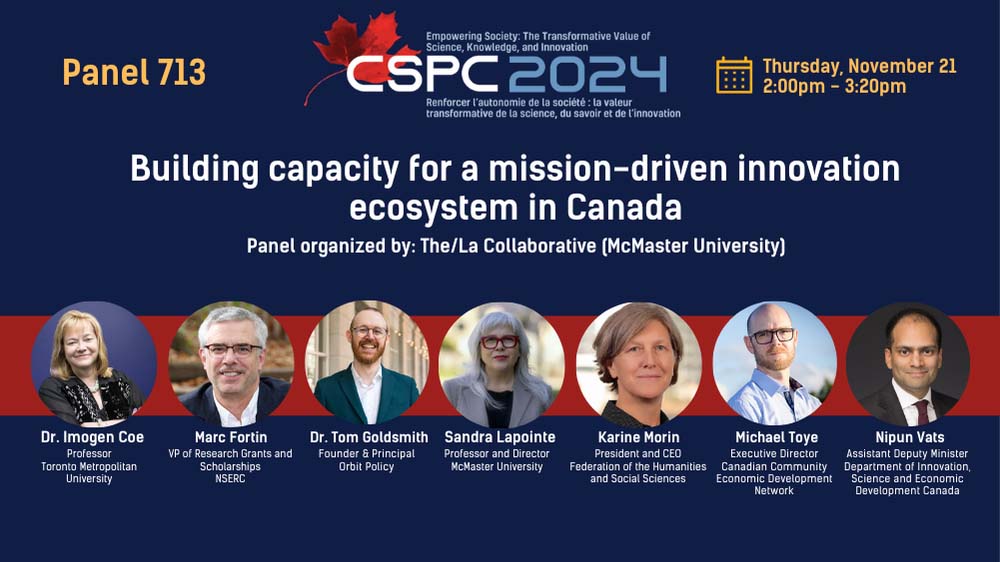Abstract:
To address emergent societal challenges and generate societal prosperity, mission-based innovation needs to be grounded in apt approaches to complexity and knowledge management. This involves a dedicated effort to create alignment in policy across levels to optimize overall impact, enhanced programming for inclusive, innovation-focused skills-training of highly qualified personnel and support for place-based relational and material infrastructure that allow innovation flow within each zones of impact and across the innovation ecosystem.
The panel will offer a diversity of perspective on the roadmap to a fully enabled Canadian innovation ecosystem that places people and communities at the heart of prosperity.
Summary of Conversations
The discussion centred on building capacity for mission-oriented innovation ecosystems, emphasizing the importance of systems and complexity theory. Participants explored various approaches to mission-oriented innovation policy, highlighting the crucial role of government in coordination and implementation. The current science and innovation model’s failure to translate knowledge into societal benefits was discussed, alongside the need for directionality and connectedness to tackle complex challenges. Shifting behaviours and reward systems within universities and government were identified as essential for fostering collaboration and addressing societal challenges effectively.
Take Away Messages/ Current Status of Challenges
Here is the current status of challenges:
- The current model of science and innovation has not adequately translated research into tangible societal and economic benefits for Canadians.
- Existing institutional structures, particularly in universities, are rooted in exclusionary, Eurocentric models that hinder collaborative, interdisciplinary approaches.
- Traditional reward systems in academia prioritize individual achievement over collaborative, stakeholder-engaged projects.
- Governmental structures and accountabilities often reinforce excellent science, but in ways defined for today.
- There is a disconnect between the linear, accountable expectations of government and the emergent, non-linear nature of solving complex problems.
- Meaningful stakeholder engagement and co-creation methods are often superficial, lacking genuine shared ownership and accountability.
- An over-reliance on quantitative metrics and economic indicators overshadows the qualitative and social dimensions of complex issues.
- Silos exist across universities, federal departments, NGOs and private sector, creating barriers to the ability to address real world problems and solutions.
Recommendations/Next Steps
Here are recommendations:
- Prioritize implementation strategies that foster connectivity and intelligence across portfolios of projects, ensuring meaningful partnerships between academia, industry, and community.
- Incentivize and reward interdisciplinary collaboration and engagement with stakeholders from all sectors.
- Establish clear values as a starting point when addressing missions.
- Promote social innovation approaches, emphasizing community-led initiatives and integrating practitioners and community members into all stages of the innovation process.
- Develop and implement comprehensive impact charters within higher education to shift reward structures and encourage socially impactful research.
- Foster a culture of experimentation and learning, accepting that failure is a necessary part of addressing complex challenges.
- Bridge the divide in language, understanding, and expectations between government, academia, and other stakeholders.
- Incorporate diverse evaluation methods to track the societal impact of research.
* This summary has been generated with the assistance of AI tools


